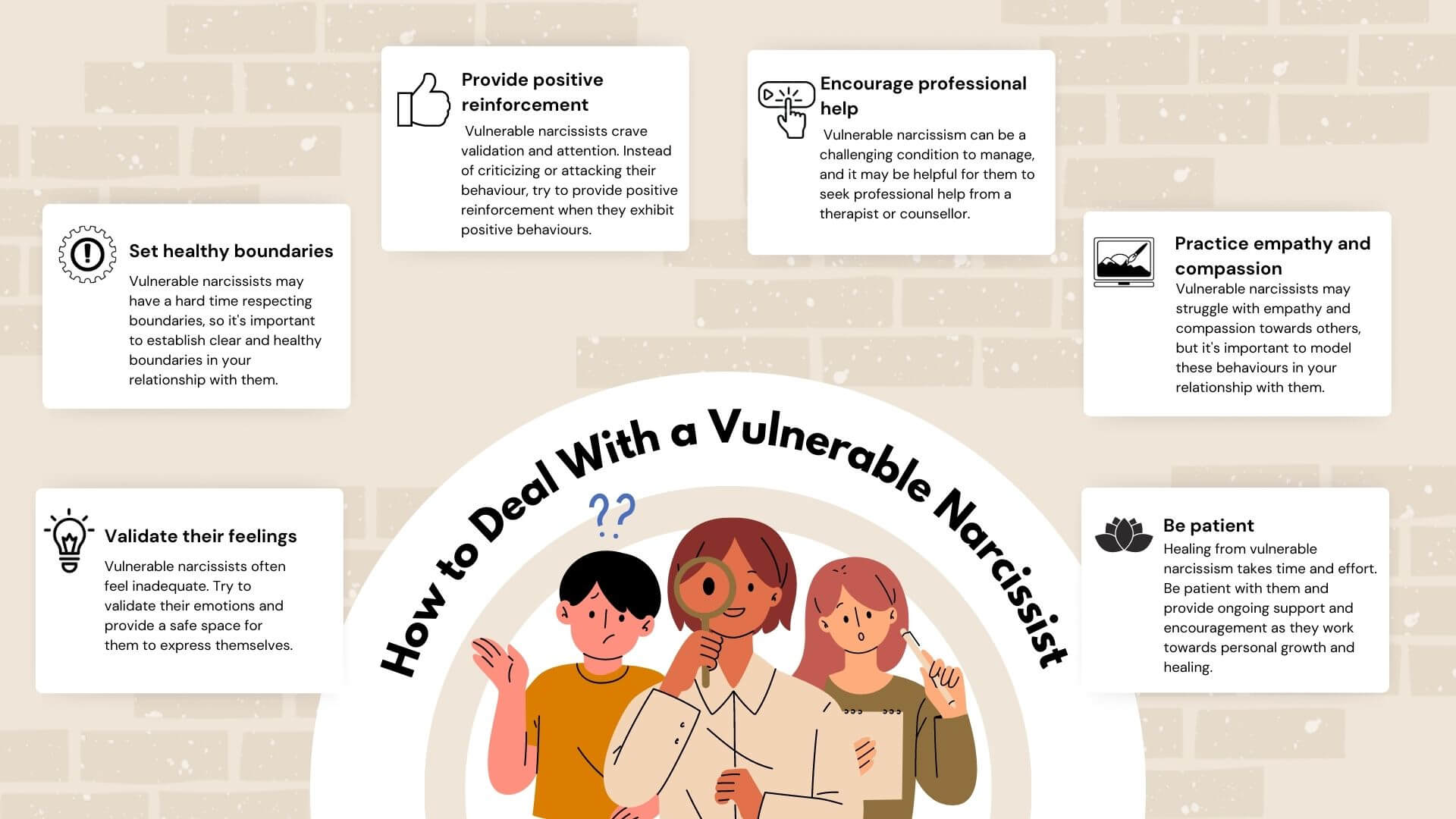
As humans, we all have our fears and insecurities, and this includes narcissists. However, vulnerable narcissists are often overlooked when it comes to discussing their fears. In this article, I will explore what vulnerable narcissists fear, how it impacts their behaviour, and a deeper look into the underlying question faced by many “Can a vulnerable narcissist change”?
In This Article
ToggleUnderstanding Vulnerable Narcissism
Common narcissistic signs include a deep need for attention and admiration, a strong sense of entitlement, a lack of empathy, selfishness, and manipulation. With that in mind, let’s define what vulnerable narcissism is. Vulnerable narcissism is a subtype of narcissism characterized by feelings of inadequacy, vulnerability, and hypersensitivity to criticism. Unlike grandiose narcissists, who have an inflated sense of self-importance and are often aggressive and exploitative, vulnerable narcissists are more introverted and self-deprecating.
Harvard lecturer Craig Malkin, PhD claims that a noticeable feature of vulnerable narcissists is that they feel that their pain is more important than others as they have “suffered the most”. Furthermore, they believe this to be true so they tend to suffer severely from these often exaggerated issues.
Top 11 Signs of a Vulnerable Narcissist
Excessive Sensitivity to Criticism:
- Vulnerable narcissists react intensely to criticism, even if it’s mild or constructive. They may become defensive, hurt, or overly emotional, interpreting feedback as a personal attack rather than an opportunity for growth.
Introverted or Withdrawn Behavior:
- Unlike their more extroverted counterparts, vulnerable narcissists often appear shy or reserved. They might avoid social situations due to a fear of rejection or judgment, making them seem socially anxious or withdrawn.
Chronic Feelings of Inadequacy:
- These individuals frequently express feelings of inadequacy, believing they are unappreciated or undervalued. Despite any outward accomplishments, they struggle with persistent self-doubt and a lack of self-esteem.
Envy and Resentment:
- Vulnerable narcissists often feel envious of others’ success, happiness, or recognition. They harbor resentment towards those they perceive as more fortunate or accomplished, feeling that life is unfairly biased against them.
Passive-Aggressive Tendencies:
- Rather than confronting issues directly, they express their frustrations through passive-aggressive behavior. This might include sarcastic comments, backhanded compliments, or silent treatment, making it difficult for others to address the underlying problems.
Grandiose Fantasies:
- They engage in elaborate fantasies about achieving great success, fame, or admiration. These daydreams often involve unrealistic or exaggerated scenarios where they are the center of attention and receive the recognition they feel they deserve.
Self-Absorption and Preoccupation:
- Vulnerable narcissists are highly preoccupied with their own problems and needs. Their self-absorption makes it challenging for them to empathize with others unless the situation directly relates to their own experiences or struggles.
Emotional Instability:
- They experience frequent and intense mood swings, shifting from feelings of superiority to deep insecurity and worthlessness. This emotional volatility can also manifest as symptoms of depression or anxiety, making their behavior unpredictable.
Victim Mentality:
- These individuals often see themselves as perpetual victims of circumstance or the actions of others. They tend to blame external factors for their problems, believing they are unfairly treated and misunderstood by the world around them.
Seeking Validation:
- Constantly in need of reassurance, vulnerable narcissists seek validation from others to bolster their fragile self-esteem. They may use social media, relationships, or other platforms to gain attention, approval, and affirmation from those around them.
Fragile Self-Image:
- Their self-worth is highly unstable and relies heavily on external validation. Any perceived neglect, criticism, or lack of attention can severely impact their self-image, leading to feelings of worthlessness and deep emotional distress.
Understanding these signs can help in recognizing and managing interactions with vulnerable narcissists, fostering healthier relationships and better emotional well-being for everyone involved.
How These Fears Impact Behaviour
Vulnerable narcissists’ fears impact their behaviour in several ways. For example, their fear of rejection and abandonment may lead them to seek constant validation and attention from others. They may also become overly dependent on their partner or friends, fearing that they will be left alone if they don’t do everything in their power to keep them around.
Their fear of criticism may lead them to avoid situations where they might be criticized. They may also become defensive or aggressive when they feel criticized or rejected, lashing out at others in an attempt to protect themselves.
Their fear of failure may lead them to avoid taking risks or trying new things. They may also become overly competitive, feeling the need to prove themselves and their worth to others.
Finally, their fear of intimacy may lead them to avoid emotional closeness with others. They may struggle to form deep connections with others, preferring to keep relationships superficial and shallow.
6 Tips on How to Talk to a Vulnerable Narcissist

Dealing with vulnerable narcissists can be challenging, but there are ways to effectively manage their behaviour and support them in their journey towards healing. Here are some tips on how to deal with vulnerable narcissists:
Validate their feelings – Vulnerable narcissists often feel inadequate and insecure. Instead of dismissing their feelings or telling them to “just get over it,” try to validate their emotions and provide a safe space for them to express themselves.
Set healthy boundaries – Vulnerable narcissists may have a hard time respecting boundaries, so it’s important to establish clear and healthy boundaries in your relationship with them. Let them know what behaviour is and is not acceptable and enforce consequences if necessary.
Provide positive reinforcement – Vulnerable narcissists crave validation and attention. Instead of criticizing or attacking their behaviour, try to provide positive reinforcement and praise them when they exhibit positive behaviours.
Encourage professional help – Vulnerable narcissism can be a challenging condition to manage, and it may be helpful for them to seek professional help from a therapist or counsellor. Encourage them to seek help and provide support throughout the process.
Practice empathy and compassion – Vulnerable narcissists may struggle with empathy and compassion towards others, but it’s important to model these behaviours in your relationship with them. Try to understand their perspective and provide support and compassion when they are struggling.
Be patient – Healing from vulnerable narcissism takes time and effort. Be patient with them and provide ongoing support and encouragement as they work towards personal growth and healing.
In summary, dealing with vulnerable narcissists requires patience, understanding, and clear boundaries. By providing validation, positive reinforcement, and encouraging professional help, you can support them in their journey towards healing and personal growth.
Am I a Vulnerable Narcissist?
If you think you may be a vulnerable narcissist, it’s important to take steps towards self-awareness and personal growth. Here are some tips on what to do if you suspect you are a vulnerable narcissist:
Seek professional help – Consider speaking with a therapist or counsellor who can help you understand your behaviour and work towards personal growth and healing.
Practice self-reflection – Take time to reflect on your thoughts, feelings, and behaviours. Try to identify patterns of behaviour that may be indicative of vulnerable narcissism and work towards changing those behaviours. This will improve your overall emotional intelligence.
Focus on empathy and compassion – Vulnerable narcissists may struggle with empathy and compassion towards others. Practice putting yourself in other people’s shoes and try to understand their perspective.
Learn healthy coping mechanisms – Vulnerable narcissists may rely on unhealthy coping mechanisms, such as avoidance or denial. Work on developing healthy coping mechanisms, such as mindfulness, meditation, or exercise.
Seek support from loved ones – Reach out to trusted friends and family members who can provide support and encouragement as you work towards personal growth and healing.
It’s important to remember that vulnerability and personal growth take time and effort. Be patient with yourself and focus on making small, positive changes towards self-awareness and personal growth. With professional help and support from loved ones, you can overcome vulnerable narcissism and work towards a healthier, more fulfilling life.
How Do I Heal my Vulnerable Narcissism
Knowing how to stop being a vulnerable narcissist involves a combination of self-awareness, self-reflection, and personal growth. Recognising the tendencies of seeking validation and feeling inadequate is crucial. Engaging in introspection can help uncover the root causes of these behaviours, often linked to past experiences or insecurities. Practising empathy and active listening towards others fosters healthier relationships and diminishes self-centred tendencies. Shifting focus from self-absorption to genuine interest in others’ well-being aids in breaking the narcissistic cycle.
So, knowing how to deal with a vulnerable narcissist is one thing, but actually putting these steps into practice and reaping those rewards is another. But don’t worry, I’m here to help.
I'm Donovan...
And I've helped many people who have been in similar positions as yourself.
Struggling with the challenges of being in a relationship with a vulnerable narcissist or recognizing those traits in yourself? You’re not alone, and help is here. I specialize in guiding individuals through the complexities of vulnerable narcissism, fostering healthier relationships, and building stronger self-awareness. Together, we will navigate your emotional landscape, break toxic patterns, and cultivate a more fulfilling life.
Want to see how we can transform your experience?






